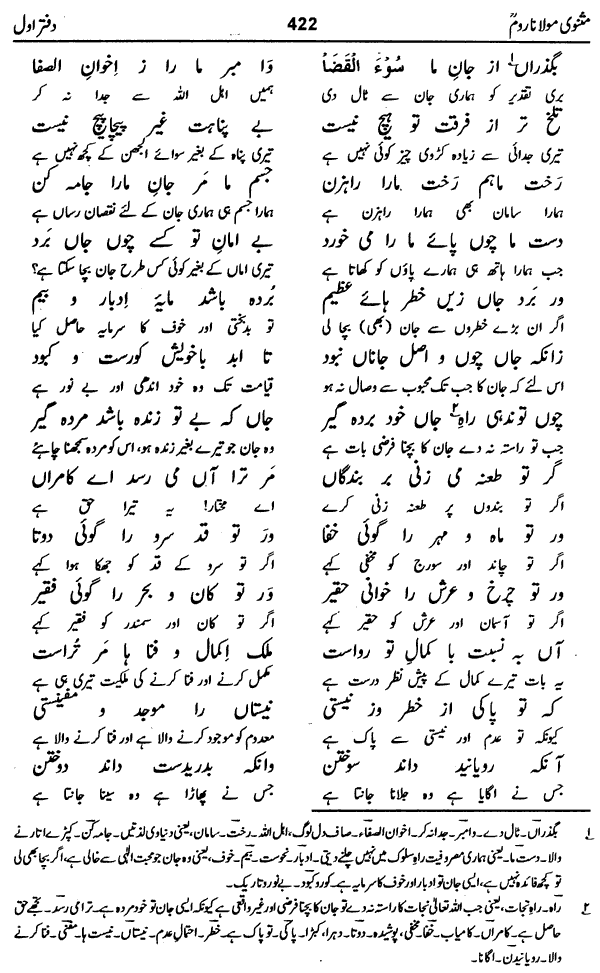How Adam, on whom be peace, marvelled at the perdition of Iblís and showed vanity.
One day Adam looked with contempt and scorn on Iblís who is damned.
He behaved with self-conceit and became self-approving: he laughed at the plight of accursed Iblís.
If He should turn the fur inside out, He would tear up from root and bottom (even) the (firmest) mountain (of faith);
At that instant He would rend the veil of (put to shame) a hundred Adams and bring (to light) a hundred Devils newly converted to Islam.”
Adam said, “I repent of this look; I will not think so disrespectfully again.”
O Help of them that call for help, lead us (aright)! There is no (cause for) pride in knowledge or riches.
Our (worldly) goods waylay (and plunder) our (spiritual) goods: our bodies tear the garment (of spirituality) from our souls.
Inasmuch as (the evil wrought by) our hand devours (the good towards which we move) our foot, how shall any one save his soul without your security?
Because the soul, when it is not united with the Beloved, is blind and blue (miserable) with itself for ever.
When you wilt not give him admission (to your presence) —even suppose he has saved his soul, regard as dead the soul that would live without You.
If you art upbraiding your slaves, that is suitable to you, O you whose every wish is fulfilled.
And if you say that the sun and moon are scum, and if you say that the (straight) stature of the cypress is (bent) double,
For you art holy (and free) from danger and from non-existence: you art He that brings the non-existent ones into being and endows (them with existence).
He that made to grow can burn (destroy), because when He has torn, He can sew (mend).
Every autumn He burns (withers) the garden; (then) He makes to grow again the rose that dyes (the garden),
The eye of the narcissus became blind: He restored it; the throat of the reed was cut: He himself fostered it again (and revived it).
Since we are made (by God) and are not makers, we are not (entitled to be anything) but humble and content. We all are of the flesh and busy with fleshliness: if you call us not (to Yourself), we all are Ahrimans (Devils). (If) we have been delivered from Ahriman, (it is only) because you have redeemed our souls from blindness.
Any one to whom fire is a refuge and support becomes both a Magian and a Zoroaster.
Everything except Allah is vain: verily the grace of Allah is a cloud pouring abundantly and continually.
Returning to the story of the Prince of the Faithful, ‘Alí—may God honour his person!— and how generously he behaved to his murderer.
Go back to ‘Alí and his murderer, and the kindness he showed to the murderer, and his superiority (moral and spiritual excellence).
The death of deathlessness is lawful to us, the provision of unprovidedness is a bounty to us.
It is death outwardly but life inwardly: apparently It is a cutting-off (decease), in secret (in reality) It is permanence (life without end).
To the embryo in the womb birth is a going (to another state of existence): in the world it (the embryo) blossoms anew.
for me,
Because (only) the sweet berry is prohibited; (for) how should it become necessary to prohibit the sour one?
The berry that has a sour kernel and rind—its very sourness and disagreeableness are (serve as) a prohibition of it. To me the berry of dying has become sweet: (the text) nay, they are living has come (from God) on my account. Slay me, my trusty friends, slay me, vile as I am: verily, in my being slain is my life for evermore.
If there were not in my staying (in this world) my separation (from God), He would not have said, ‘Verily, we are returning to
Him.’”
The returning one is he that comes back to his (native) city, and (fleeing) from the revolution of Time approaches the Unity.
How the stirrup-holder of ‘Alí, may God honour his person, came (to him), saying, “For God's sake, kill me and deliver me from this doom.”
“He came back, saying, ‘O‘ Alí, kill me quickly, that I may not see that bitter moment and hour. Shed my blood, I make it lawful to you, so that my eye may not behold that resurrection’.
None (of them) could cut from you the tip of a single hair, since the Pen has written against you such a line (of doom). But do not grieve: I am intercessor for you: I am the spirit's master, I am not the body's slave.
This body has no value in my sight: without my body I am the noble (in spirit), the son of the noble. Dagger and sword have become my sweet basil: my death has become my banquet and narcissus-plot.’”






No comments:
Post a Comment